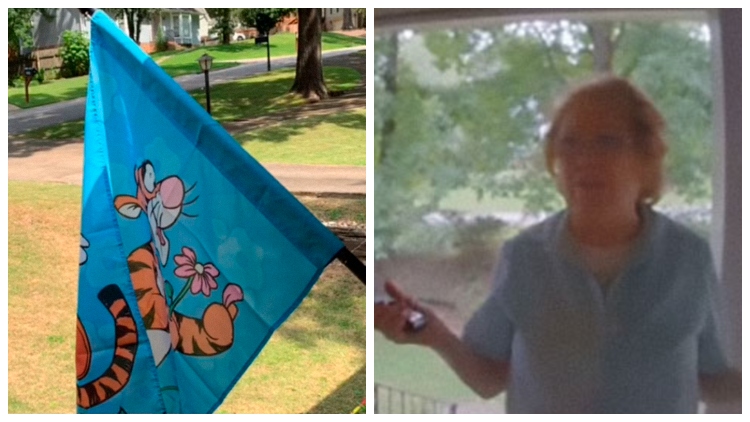Karens
‘Neighborhood Karen’: Tigger Flag Goes Viral

A famous TikTok video introduced homeowner Tayler Bishop to “Neighborhood Karen.” The dispute? Tigger-themed “Winnie the Pooh” flag. Tayler Bishop, aka @tizzybizzy92, posted the video on TikTok, capturing Karen’s unhappiness and sparking a debate.
@tizzybizzy92 A tigger flag!!😝😂#neighborhoodkaren ♬ original sound – Ambrosia
Bishop’s porch security video shows the woman protesting about the Tigger banner. Karen criticized the flag and the neighborhood’s appearance, demanding standards. This first conversation caused a multi-platform social media frenzy.
‘Neighborhood Karen’: Social Media Reaction And Support
The video went viral with 1.1 million likes and 10.5 million TikTok views. Bishop’s outstanding response to Karen’s arguments was lauded online. Viewers supported Karen’s disdain for the innocuous Tigger banner and were confused.
TikTok users laughed and wondered, “Tigger? Like Winnie the Pooh Tigger? I’m confused.” One said, “You ruined her day by not giving in to her desire for an argument.”
Social commentary on the ‘Karen’ incident
The name “Karen” in the video reflects a cultural issue. Recent years have associated the epithet with entitled and belligerent conduct, typically related to rule enforcement or perceived policing. The Tigger Flag incident is one example of this practice that draws social media attention and commentary.
Travon Free, a comedian, tweeted, “Some white people continue to have a strange entitled obsession with rule enforcement and policing other free people that can be directly traced to their relationship with the police and America’s historical legacy of white supremacy.” This article is part of a more extensive discourse regarding entitlement, rule-following, and oppressed populations.
A Closer Look At The Tigger Flag
In a follow-up video, Tayler Bishop showed the claimed obscene banner that upset Karen. Bishop said that Tigger carrying a flower on the teal flag was from ‘Winnie the Pooh.’ The innocent and playful design puzzled visitors who couldn’t understand Karen’s strong complaint.
Bishop’s calmness contrasted with Karen’s accusation that the banner made the area tacky as the camera moved over it. Many viewers were confused by how a cheery representation of Tigger could be disrespectful. This visual discovery illuminated aesthetic preferences’ subjectivity and the community-wide effects of such debates.
Social Media Echo Chamber: Support And Criticism
The ‘Neighborhood Karen’ event spread beyond TikTok, with Twitter becoming a major forum. The movie was seen by individuals who supported Tayler Bishop and examined the ‘Karen’ issue. Some have argued that the phrase is stereotypical despite its widespread use.
Twitter users praised Bishop’s calm answer to Karen’s evident thirst for conflict. Travon Free, an Emmy-winning comedian, linked the event to entitlement and racial racism. The incident’s significance in the modern cultural debate was reinforced by social media comments of humor, irritation, and a desire for understanding in the face of unreasonable arguments.
Read Also: Central Park Karen: A Deep Dive Into Consequences, Complexity, And Redemption
Unexpected Virality And Unwavering Support
Tayler Bishop was surprised by the video’s virality. In later TikTok videos, she said she hadn’t heard from Karen since a “drive-by apology.” After the argument, Karen screamed an apology while driving past Bishop’s home, an unexpected turn of events.
Bishop thanked the internet community for their fantastic support. The event made her famous and sparked discussions about power relations in similar situations. As the ‘Neighborhood Karen’ video circulated online, several people, like “Billions” creator Brian Koppelman, joked about putting Tigger flags on their doors in solidarity, turning an unexpected tragedy into a sign of community resilience and support.
Karen Phenomenon: Social And Historical Implications
Though sometimes joked about, the ‘Karen’ phenomenon has severe historical and cultural ramifications. Some evaluate privilege and power relations via the word describing entitled and combative people. Karen’s complaint about a harmless Tigger flag triggered a discussion about entitlement and rule enforcement in daily encounters.
The Karen phenomenon is linked to systemic concerns by comedian Travon Free’s tweet linking it to “America’s historical legacy of white supremacy.” Many say the word oversimplifies complicated relationships, while others say it helps address disadvantaged behaviors. Although seemingly trivial, the Tigger flag argument is a microcosm of the continuing debate about power, privilege, and social standards.
Social Media Influences Narratives
The quick spread of the ‘Neighborhood Karen’ video on social media shows how digital environments shape and magnify narratives. Tayler Bishop’s TikTok post made the event go viral, provoking debates beyond the original conflict. Social media’s ability to quickly link people internationally has made it a valuable tool for identifying and examining such instances, allowing communal reactions and observations.
Twitter support and criticism reflect the varied opinions that arise after such tragedies. The incident’s rise from a local argument to a worldwide discourse shows how social media shapes public narratives, illuminates social norms and sparks discussions about privilege, entitlement, and community dynamics.
Tigger Flag Symbolizes Resilience And Unity
Through the comedy and criticism of ‘Neighborhood Karen,’ the Tigger flag symbolized resiliency and community solidarity. Many supported Tayler Bishop’s flag display despite Karen’s protests as nonviolent opposition to undue scrutiny. The ensuing vow by others like Brian Koppelman to fly Tigger flags in sympathy made the event a humorous symbol of community support.
Before symbolizing personal property rights, the Tigger flag was a source of conflict. This unexpected result shows how symbols shape narratives and build a feeling of belonging and shared identity in online and offline groups.












You must be logged in to post a comment Login